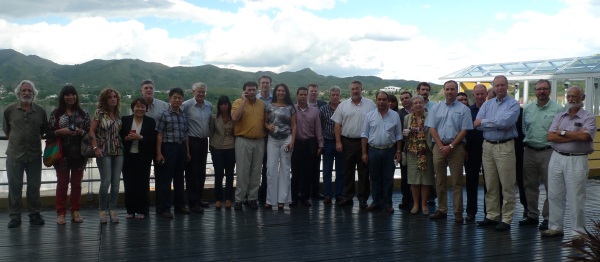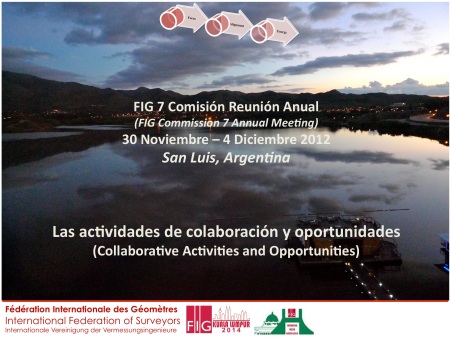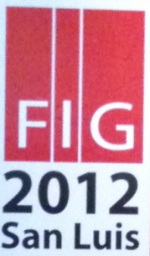FIG Commission 7 Annual Meeting and One-day International
Symposium
Hotel Perero de los Funes, San Luis, Argentina, 30 November - 4 December
2012
FIG President CheeHai TEO joined FIG Commission 7 Delegates at its
2012 Annual Meeting at Hotel Potrero de los Funes, San Luis, Argentina. The
annual event included a One-day International Symposium with the theme “Land
Governance in South America and International Perspectives”. This year’s
event was generously supported by the San Luis Provincial Government and
co-organized by Mr. Fernando Daniel Nasisi, the President of Consejo
Federal de Catastro.
|

Most of the Participants at the 2012 FIG Commission 7 Annual Meeting |
At the Annual Meeting, the FIG President was able to listen to various
national reports, updates and initiatives and later engaged delegates with
his presentation on the recent developments within cadastre and land
management that should be noted and addressed by FIG Commission 7 and its
national delegates. In particular, he highlighted various collaborative
activities and opportunities with partner institutions such as the United
Nations Human Settlement Program Global Land Tools Network, Food and
Agriculture Organization of the United Nations and the World Bank.
|
 |
The One-day International Symposium was also supported by the Federacion
Argentina de Agrimensores, the sole member association in FIG from
Argentina, whose current President, Mr. Cesar Mario Garachico,
attended and participated as a Panelist. The Governor of the Province of San
Luis, Mr. Claudio Javier Poggi, graced and opened the Symposium.
Delegates and participants to the Annual Meeting were joined by fellow
professionals from around Argentina and the region at the One-day
International Symposium.
|
 |
The President spoke of the need for Profession in the
region to recognize global initiatives on the continuum of land
rights, on sustainable urbanization through equitable access to
land, housing, basic services and infrastructure, on Responsible
Governance of Tenure of Land, Fisheries and Forest, on spatially
enabling governments and societies, on managing all information
spatially, collectively contributing towards greater transparency
and good governance, towards whole-of-government effectiveness and
efficiencies in citizen-centric services. He also added that the
Profession should seek to engage these initiatives locally and
nationally, to extend the use and usefulness of surveying (its
science, its technologies, its knowledge and its practices) for the
wider good, towards addressing the many challenges faced by
communities, nations, regions and the world.
|
CheeHai TEO
December 2012
20 December 2012
|

























